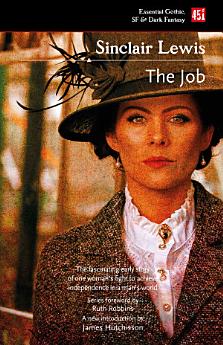The Job
Oct 2024 · Simon and Schuster
Ebook
416
Pages
family_home
Eligible
info
reportRatings and reviews aren’t verified Learn More
About this ebook
Sinclair Lewis' scandalous tale of Una Golden, who dared to work, marry, divorce and find success in the male-dominated society of New York in the early 1900s.
Sinclair Lewis, the first American to win the Nobel Prize for literature, and a writer lauded both for his craft and his principles, wrote The Job as a statement of female empowerment, and self-determination over societal expectation. Written in the early years of the 1900s Lewis' central character, highly unusual for the era, is a woman, Una Golden, who gains work in an exclusively male world of commercial real estate. Golden struggles for the recognition of her male peers while balancing romantic and work life; she marries, divorces, continues to work hard and finally emerges triumphant on her own terms.
Foundations of Feminist Fiction. The early 1900s saw a quiet revolution in literature dominated by male adventure heroes. Both men and women moved beyond the norms of the male gaze to write from a different gender perspective, sometimes with female protagonists, but also expressing the universal freedom to write on any subject whatsoever.
Sinclair Lewis, the first American to win the Nobel Prize for literature, and a writer lauded both for his craft and his principles, wrote The Job as a statement of female empowerment, and self-determination over societal expectation. Written in the early years of the 1900s Lewis' central character, highly unusual for the era, is a woman, Una Golden, who gains work in an exclusively male world of commercial real estate. Golden struggles for the recognition of her male peers while balancing romantic and work life; she marries, divorces, continues to work hard and finally emerges triumphant on her own terms.
Foundations of Feminist Fiction. The early 1900s saw a quiet revolution in literature dominated by male adventure heroes. Both men and women moved beyond the norms of the male gaze to write from a different gender perspective, sometimes with female protagonists, but also expressing the universal freedom to write on any subject whatsoever.
About the author
Harry Sinclair Lewis (1885–1951) was an enormously successful author both commercially and critically, but despite being the first writer from the US to win the Nobel Prize in Literature in 1930, he has been criminally underrated – until recently. Born in Minnesota, he graduated from Yale in 1908 and pursued his vocation, writing for newspapers and magazines and publishing potboilers until releasing his first serious novels, including 1917’s The Job. His stellar success came with the satirical novels Main Street (1920) and Babbitt (1922) and several of his works were adapted for film. His insightful criticism of American capitalism, mores and politics (not least his uncanny 1935 dystopia It Can't Happen Here), and his representations of modern working women mark him out as a truly far-sighted novelist of our time.
James M. Hutchisson (Introduction), Emeritus Professor of English at The Citadel in Charleston, South Carolina, is a specialist in nineteenth- and twentieth-century American literature. He is the author of The Rise of Sinclair Lewis, editor of Sinclair Lewis: New Essays in Criticism, and Past President of The Sinclair Lewis Society. His most recent book is Ernest Hemingway: A New Life.
Ruth Robbins (Series Foreword) is Professor of English Literature and Director of Research for Cultural Studies at Leeds Beckett University. She has published widely on both feminism and the literature of the period 1870–1940. Her books include Literary Feminisms, Pater to Forster, 1873–1924, Subjectivity, Oscar Wilde and The British Short Story. She is currently working on Virginia Woolf: A Writer’s Life.
James M. Hutchisson (Introduction), Emeritus Professor of English at The Citadel in Charleston, South Carolina, is a specialist in nineteenth- and twentieth-century American literature. He is the author of The Rise of Sinclair Lewis, editor of Sinclair Lewis: New Essays in Criticism, and Past President of The Sinclair Lewis Society. His most recent book is Ernest Hemingway: A New Life.
Ruth Robbins (Series Foreword) is Professor of English Literature and Director of Research for Cultural Studies at Leeds Beckett University. She has published widely on both feminism and the literature of the period 1870–1940. Her books include Literary Feminisms, Pater to Forster, 1873–1924, Subjectivity, Oscar Wilde and The British Short Story. She is currently working on Virginia Woolf: A Writer’s Life.
Rate this ebook
Tell us what you think.
Reading information
Smartphones and tablets
Install the Google Play Books app for Android and iPad/iPhone. It syncs automatically with your account and allows you to read online or offline wherever you are.
Laptops and computers
You can listen to audiobooks purchased on Google Play using your computer's web browser.
eReaders and other devices
To read on e-ink devices like Kobo eReaders, you'll need to download a file and transfer it to your device. Follow the detailed Help Center instructions to transfer the files to supported eReaders.






